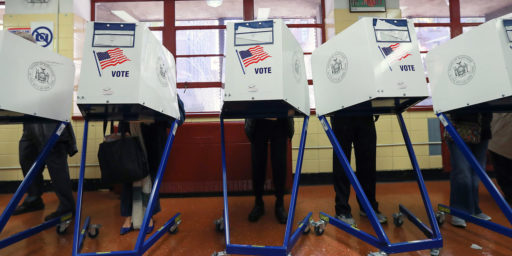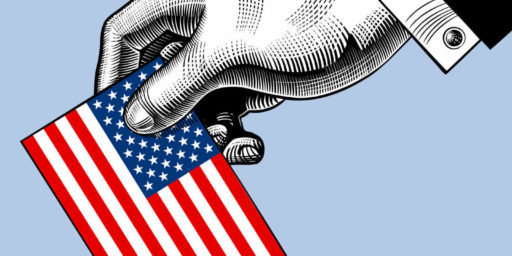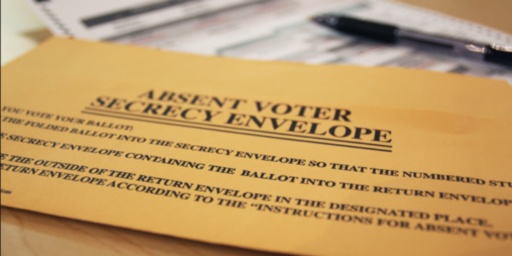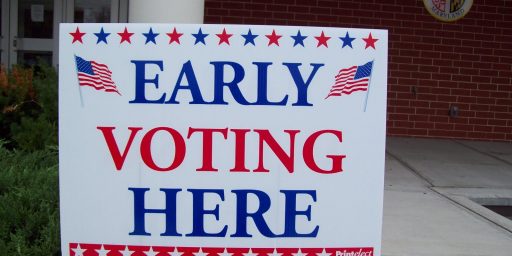Iowa Limits Early Voting
Making it harder to vote in Iowa.

Via the Des Moines Register: Gov. Kim Reynolds signs law shortening Iowa’s early and Election Day voting.
Four months after Iowans voted in record numbers, Gov. Kim Reynolds has signed legislation cutting the state’s early voting period and closing the polls an hour earlier on Election Day.
[…]
While there is no evidence of widespread voter fraud in Iowa or nationally, Republicans have described the state’s legislation as an election integrity measure and said it will bring uniformity across Iowa’s 99 counties. Democrats say the law will suppress votes and does nothing to improve election security.
“It’s our duty and responsibility to protect the integrity of every election,” Reynolds said in a statement. “This legislation strengthens uniformity by providing Iowa’s election officials with consistent parameters for Election Day, absentee voting, database maintenance, as well as a clear appeals process for local county auditors. All of these additional steps promote more transparency and accountability, giving Iowans even greater confidence to cast their ballot.”
And here we have an in-the-wild application of the term “integrity” to election law changes when a major part of said “integrity” is really just making it more difficult.
The law cuts Iowa’s early voting period from 29 days to 20. Polls will now close at 8 p.m. for state and federal elections instead of 9 p.m.
It significantly tightens the rules for when absentee ballots must be received by county auditors in order to be counted. Ballots must now arrive by the time polls close in order to be counted. Previously, ballots placed in the mail the day before Election Day could be counted as long as they arrived by noon the following Monday.
Republicans have sharply criticized county auditors who they say acted inappropriately during the 2020 election. The law strips auditors of much of their discretion in running elections in their counties. Auditors may no longer establish satellite in-person early voting sites unless petitioned to do so by residents, and they may not mail absentee ballot request forms to voters unless a voter asks for one.
Look, while one can argue the degree to which 20 or 29 days of early voting is the optimal number, or whether polls should be open to 8pm or 9pm, the bottom line is that the new law does cut back access to voting for Iowans. Likewise, the various other provisions make voting harder. One can even see that some increased level of security is created, but the real question is: do these marginal increases in security outweigh the loss of democratic access for voters?
My initial assessment would be no. After all, the level of fraudulent voting that these measure seek to address is known to be minimal. But there is little doubt that any set of actions that make it harder to vote will almost certainly lead to fewer people voting.
And, of course, that appears to be the real goal.
More provisions of the law include:
The law makes it a felony for auditors, or any other election officials, to fail to carry out state election laws or to violate guidance from the Iowa secretary of state. Auditors could also face fines of up to $10,000 for “technical infractions” of their duties.
This strikes me, by the way, as a threat to local officials to make them hesitant to help voters for fear of running afoul of the law. What local level official wants to face a $10k fine for “technical infractions”?
More:
The law also limits who can return a voter’s absentee ballot. Only the voter, an immediate family member, household member or caregiver may return the ballot to the auditor’s office or place it in the mail. Previously, anyone the voter designated could deliver the ballot on the voter’s behalf, but the new law makes it a serious misdemeanor for any unauthorized person to do so. Republicans said the restriction is necessary to prevent “ballot harvesting” by political parties or outside groups.
The law allows counties to establish one ballot drop box at the auditor’s office, under video surveillance.
Look, limiting who can deliver an absentee ballot is clearly going to have the effect of limiting voting by the elderly and the poor. And while video surveillance of drop box is fine, this sounds like a limitation of a number of such boxes.
Again, there is some level of increase in security in some of these measures. Some, such as collecting absentee ballots for delivery, can be legitimately debated. But the bottom line of all of this, again, is that it clearly makes voting harder for a minor increase in said security to solve a problem that doesn’t exist.
And lest someone try to say, “voter fraud is real,” one is correct in the sense that there are very minor and insignificant examples of persons breaking elections-related laws. But the numbers are minuscule to the point of being irrelevant in almost every election that occurs and none of these rules changes are going to affect that fact.
For example,
There were 12 convictions for election misconduct in Iowa in fiscal years 2019 and 2020, according to a fiscal note on the legislation compiled by the nonpartisan Legislative Services Agency.
The scourge of 6 infractions a year must be stopped!
Meanwhile, note
More than 1.7 million Iowans cast ballots in last year’s election — nearly 76% of registered voters. That included more than 1 million people who voted early, either by mail or in person. Both those figures broke state records.
According to data from the Iowa secretary of state, 76% of Democrats and 52% of Republicans voted early in the 2020 election, either by mail or in person.
All of the provisions to increase “integrity” are aimed at early voting and the ease of early voting. And, coincidentally I’m sure, far more Democrats in the state availed themselves of these options in 2020 than did Republicans.
This is not about “integrity,” it is about making it harder to vote in ways that one party uses more than does the other.
BTW: Republicans did really well in the 2020 in Iowa.





OK, the R-party did really well in 2020 in Iowa. But their constituents have FEELINGS, donchanoe. And they don’t believe in democracy. Democracy gives them those funny FEELINGS.
Now they’ll FEEL BETTER. Til next time the R’s lose. Then they’ll need even LESS democracy.
Another day ending in Y.
You know the expression to gild the lily?
This power grab by Republicans is explained, by them, as fireproofing the helium.
Integrity?
How much are Iowa auditors even paid? How is it worth it to take any position on any “guidance,” pro-voter or anti-? I will be interested to see if Iowa runs into any scarcity of people willing to hold that title.
This whole discussion reminds me of a random FB comment I saw last November – suggesting in just this many words that “voting is such a privilege we ought to make it harder.” I think that knee-jerk thought gets a lot of traction. I wanted to respond (and didn’t), “let’s say you have to do 10 push ups. That will make it harder, but just not for the people you are targeting.”
@Joe: voting is such a privilege we ought to make it harder.
Translation: Voting is such a privilege for people of color that we ought to make it harder for people of color to vote.
If there is karma, the GOP should definitely fear death.
@Joe: With that threat hanging out there, I’d wager a bunch of Democrats aren’t going to join the ranks as long as there’s a Republican in charge. That will lead to unqualified partisans acting in bad faith. Which encourages……actual fraud.
Hooray.
You can keep doing the Antidemocratic bullshit for a while, and you can keep ignoring the slow demographic change that is occurring for a while, but at some point the Republican Party has to go through a phase transition.
It’s not Iowa, but this paper studies the results of Louisiana’s efforts between 1878 and 2000 to limit African Americans right to vote. In the attached chart you can see the increase in African American voters registered to vote coinciding with the increased Supreme Court protection of the franchise. It shouldn’t surprise anyone that the Republican is putting so much effort in attempting to return us to the pre-Civil/Voting Rights era, it worked for them once, why not try it again.
Suppressing Black Votes: A Historical Case Study of Voting Restrictions in Louisiana
—–
P.S.
Thank you, Chief Justice Roberts. /s
Gee, 20 days plus what, another 12 hours to do something that takes minutes? The horror….
I wonder if those wacky white supremacists are behind this travesty!?
@Bill: Well, since you are doing a great job parroting some of their talking points, odds are you could just ask them.
Such contrasting post:
@Loviatar: Comes with a reference to a peer reviewed political science paper (in the discipline’s premiere journal).
@Bill: Comes with tired snark.
@Teve: “…but at some point the Republican Party has to go through a phase transition.”
Meaning like moving to an official one-party state?
@Bill: I know you don’t deserve a thorough recounting of the facts involved, but here they are:
1. The bill shortens hours for in-person voting, which punishes people with daytime jobs or jobs that they can’t take time away from.
2. The bill removed “no-excuse” absentee voting, and in most places “I have a job” isn’t sufficient excuse – or it requires documentation. This is not a trivial hoop to jump through: you have to request the excuse form (probably online), submit it with significant advance notice, then you get the ballot. This punishes working-class and poor voters.
3. The bill removes several options for 3rd-party ballot collection. That means people will need (a) reliable USPS collection/a nearby postal collection box; (b) transportation to a post office/postal box; or (c) family members who are willing to provide a drop-off. It’s obvious that (a) can be manipulated by the USPS (as was done in 2020), making (b) more of a necessity. But (b) is harmful to the poor and handicapped, and it (by sheer numbers) affects people in cities – who often rely on public transit rather than get in your way with their cars. Which means (c) is the only thing that’s available to a lot of these people – and many of them do not have support structures available to just drop the letter with a direct family member. The ultimate effect is to…you guessed it!…reduce voting by working class and poor people. Ultimately this part affects urbanites and the working class or poor.
4. The bill levies fines and threatens workers who might unwittingly help someone vote (even with a provisional ballot), to be enforced/imposed by the state government. As noted above, this will reduce the number of opposition party people participating in the election process. It will also most significantly (numerically) affect people who have recently moved (this is usually an urban issue) or have unstable housing (read: poor, possibly homeless) or have limited access to information about the elections process in the first place (poor again). So this reduces accountability by the majority party while reducing votes of urbanites and the poor.
Put these together and we see that this bill reduces voting by one large block of people (working class and poor), with knock-on effects on a second group (urban dwellers).
Of course, to your worm-addled brain this is just sensible because, you know, most fraudulent votes are cast between 8 p.m. and 9 p.m. or by people who have a friend drop their ballot off at the PO or by people who are told they have to work on Election Day a week before it happens.
There’s zero – absolutely none! – “election protection” going on here. It’s 100% Republicans trying to reduce voting by those unsavory elements who are less likely to vote for them.
@ptfe: Well said.
@ptfe: Yawn, so I guess the point is that democrats are essentially retarded and have no idea how to vote? Thanks for clearing that up…..while showing us all that you have some sort of moral superiority or something! Here’s a clue, teach your retarded voters how to vote, it’s not rocket surgery.
@Bill:
Are you even trying to make a real argument or are you just trolling?
Surely you can’t be so stupid that you don’t understand there are hourly workers who don’t necessarily have cars, so can’t get to the polls at limited locations within restrictive times.
@Bill: To echo @Grewgills‘s question: what is your goal here?
You are coming across someone clearly trying to provoke, rather than engage. You are behaving like a troll and contributing nothing to these conversations.
Is smug, ignorant dismissiveness the best you can bring to the table?